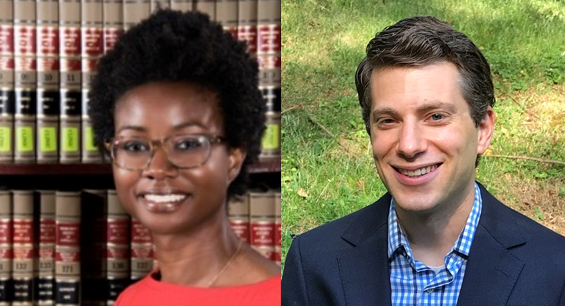
Three Rutgers Law Professors have won national awards.
Rutgers Law School Professor Matthew Shapiro won the 2021 Association of American Law Schools (AALS) Scholarly Papers Competition with his article “Distributing Civil Justice,” which will be published by the Georgetown Law Journal in June; and Professor Norrinda Hayat was recognized by the Society of American Law Teachers with a Junior Faculty Award, given to young faculty for excellence in teaching.
In addition, Rutgers Law School Professor Alexis Karteron, Director of the Constitutional Rights Clinic, has won the 2020 Shanara Gilbert National Emerging Clinician Award from the Association of American Law Schools Clinical Section.
Shapiro joined Rutgers Law last fall from the Maurice A. Deane School of Law at Hofstra University and is an expert in civil procedure and law and philosophy. In addition to his law degree, he has a doctorate in political theory and conducts research on issues in civil procedure, alternative dispute resolution, and private law from a philosophical perspective.
Shapiro reacted to winning the award, “I was thrilled and honored when I got the news, of course, but also surprised. For one thing, there are so many talented junior law professors doing exceptional work right now, so I had never expected mine, in particular, to garner special recognition. For another . . . my work tends toward the theoretical, with fewer immediate practical implications for policy debates. I’m especially grateful to the AALS selection committee for valuing that kind of scholarship.”
“My article shows that, in advocating broader access to justice, scholars call for a more egalitarian distribution of not just a single good, but rather several distinct goods.” His article goes on to point out that the goods may conflict with one another and, depending on what good is focused on, policies can promote access to justice or curb it.
Shapiro said he hopes his article will shed light on the connection between civil litigation and the fundamental moral and political values associated with constitutional law, “We can’t fully understand civil procedure or our civil justice system without recourse to normative political theory. I hope the article illustrates some of the kinds of insights that a more theoretical approach to civil procedure might yield.”
Shapiro received his award during a virtual ceremony at the AALS annual meeting on January 5.
Hayat’s Junior Faculty Award recognizes outstanding faculty who have been teaching for up to seven years, who “demonstrate a commitment to justice, equality, and academic excellence through their teaching, scholarship, and/or social justice advocacy.”
Hayat joined Rutgers Law in 2018 and directs the Civil Justice Clinic. She has also taught Landlord/Tenant Law and Critical Race Theory. During the Scholar Strike on Sept. 6, 2020, she and co-teacher Vice Dean Rose Cuison-Villazor, opened up their critical race theory class to the entire faculty and student body from both campuses.
Hayat also was one of the three main drafters of the law school’s Anti-Racism and Black Lives Matter Statement last year, which was recognized nationally. In the spring of 2020, she led a group of her clinic students to lobby for a New Jersey housing eviction freeze through a Twitterstorm, and worked with New Jersey housing advocacy groups to procure a study on the many housing impacts of the pandemic.
Hayat was appointed to the AALS Clinical Section’s Executive Committee in January 2020. Over the summer, she spoke at the opening plenary of the first online AALS Clinical Section Conference along with Rasheedah Phillips, the managing attorney at Community Legal Services in Philadelphia about “black futures under the law” in the wake of the Black Lives Matter protests.
She said, “We decided it was worth getting people together about racial justice to discuss what we were going do as a committee and also individually as law teachers, to address both our students’ concerns about what they were processing personally and what it means to be a lawyer in this time when the law is failing so many. Almost all the clinics around the country are focused on social justice work, what does that look like in this moment?”
“We can’t just marginalize and isolate Black Lives Matter,” she said. “What do we learn from this movement in terms of our clients? The vast majority of clinic clients nationally are black and brown and vast majority of clinicians are white. . . We held a conference that addressed these issues. Now it’s led to a standing committee on racial justice inside the Clinical Section.”
Hayat was honored with her award during a virtual ceremony on January 8.